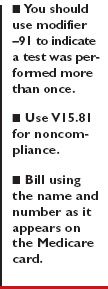Article
Coding Consult
Answers to your questions about...additional glucose tests; coding for noncompliance; beneficiary records

A. Medicare and CPT guidelines call for you to assign 82948 (glucose; quantitative, blood, reagent strip) twice and attach modifier –91 (repeat clinical diagnostic laboratory test) to the second code. You should use modifier –91 on the second code because you treated the patient after the initial test, and then repeated the glucose test following the treatment.
According to the Medicare Claims Processing Manual, you may use modifier –91 "to indicate that a test was performed more than once on the same day for the same patient, only when it is necessary to obtain multiple results in the course of treatment." The manual goes on to say not to use modifier –91 when the physician retests a patient to confirm initial results, even if the physician has testing problems with the specimens or equipment.
A. You should use V15.81 (noncompliance with medical treatment) if you're certain that the patient failed to take his prescribed medications. If you merely suspect that the patient took his medication incorrectly, you should assign the ICD-9-CM code for the patient's symptoms. For example, if the patient complained of dizziness and a lack of coordination, you should use 780.4 (dizziness and giddiness) and 781.3 (lack of coordination).
Check beneficiary records Q Medicare's been denying a lot of my claims recently, but there doesn't seem to be any correlation between the rejections and types of billed services. Any idea what's going on?
A. The Medicare beneficiary information you're submitting for each patient may be to blame. Last fall, CMS implemented a software change to require an exact match between claim data and a beneficiary's card information. So in order to avoid a rejection when you submit a Medicare claim, the data must match the beneficiary's first name, last name, and the Health Insurance Claim Number.
If you haven't updated a patient's Medicare information in a while, or if you received the demographics from the hospital, you could be submitting outdated, incomplete, or incorrect data. And a faulty match will trigger a denial.
Check patients' Medicare cards and verify that the name on your records matches the name on the beneficiary's card. If the patient indicates that the name is incorrect, you should still report the "card" information and advise him to contact his local Social Security Field Office to obtain a new Medicare card.

This information adapted from material provided by The Coding Institute. For a free sample issue or information on how to subscribe to any of 29 specialty-specific coding newsletters, please contact The Coding Institute, 2272 Airport Road South, Naples, FL 34112; phone 800-508-2582; fax 800-508-2592; or visit http://www.codinginstitute.com.





